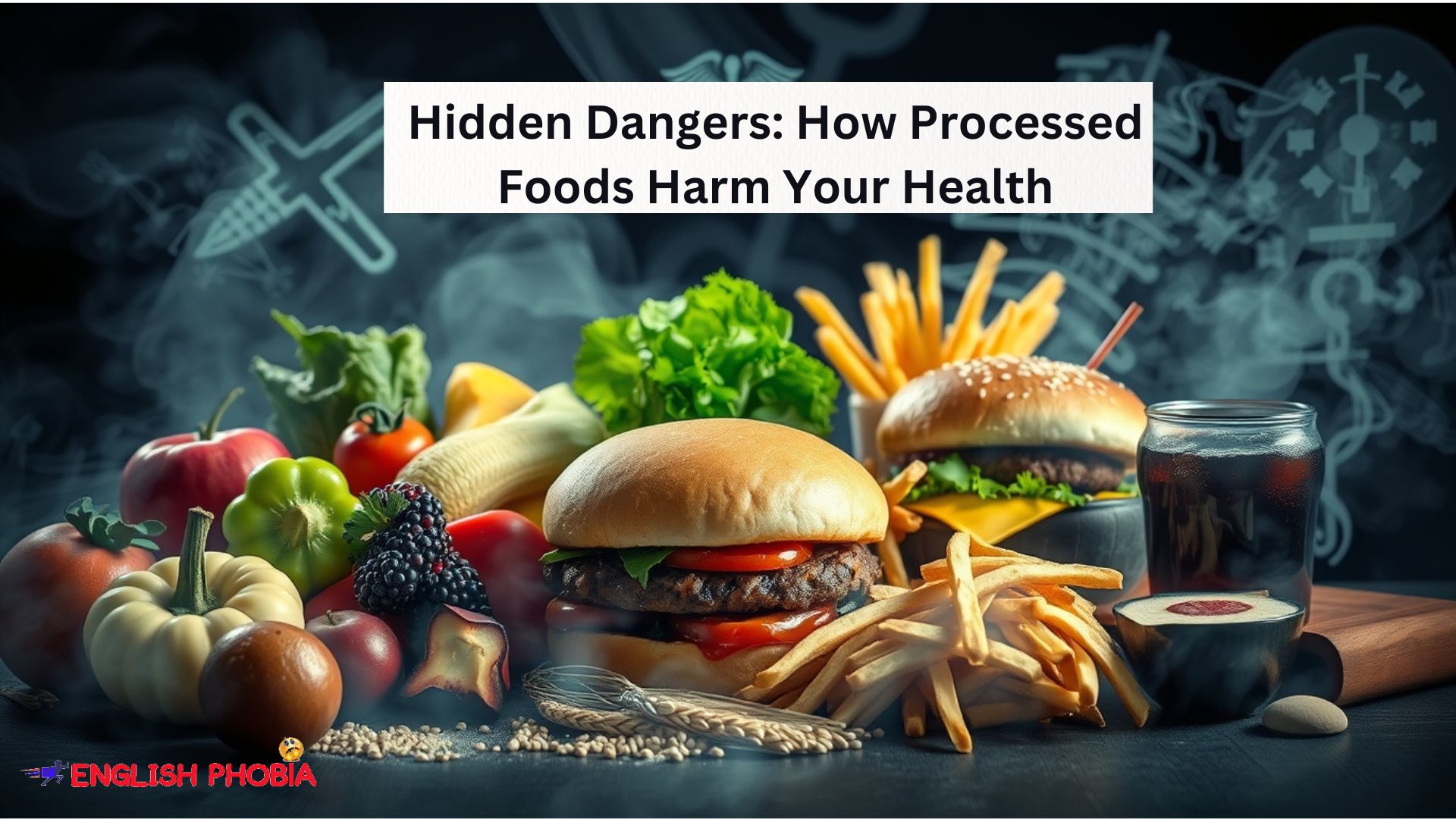In today’s fast-paced world, convenience often takes priority over health. Supermarket shelves are packed with ready-to-eat meals, snacks, and sugary drinks, making processed foods a staple in modern diets. However, what many people don’t realize is that these foods come with a hidden cost. Studies by the World Health Organization (WHO) and Harvard Medical School reveal a direct connection between processed foods and chronic diseases like obesity, diabetes, and heart disease.
But why are these foods so harmful? How do they silently damage the body? And most importantly, how can you protect yourself? Let’s uncover the hidden dangers of processed foods and understand why they are a major threat to public health.
What Are Processed Foods?
Processed foods are any foods that have been altered from their natural state for safety, convenience, or taste enhancement. These include canned vegetables, packaged snacks, frozen meals, sugary cereals, and fast foods.
However, not all processed foods are harmful. There is a key difference between minimally processed and ultra-processed foods:
- Minimally processed foods – These include frozen fruits, pasteurized milk, and whole-grain bread. They undergo minimal changes but still retain their nutritional value.
- Ultra-processed foods – These are loaded with artificial additives, preservatives, unhealthy fats, and excess sugar or salt. Examples include instant noodles, soft drinks, processed meats, and packaged desserts.
It is the ultra-processed foods that are linked to serious health risks.
How Processed Foods Harm Health
Eating ultra-processed foods regularly can have long-term negative effects on the body. Let’s explore the major ways they impact health.
Processed Foods and Obesity
Obesity rates have skyrocketed in recent decades, and processed foods are a major contributor. These foods are designed to be hyper-palatable, meaning they trigger cravings and encourage overeating. A study by the National Institutes of Health (NIH) found that people consuming ultra-processed diets ate 500 more calories per day than those eating whole foods.
Furthermore, processed foods are often loaded with refined sugars and unhealthy fats, which increase body fat storage and disrupt metabolism. This makes it easier to gain weight and harder to lose it.
Processed Foods and Heart Disease
One of the biggest risks of processed foods is their impact on heart health. These foods are high in trans fats, refined carbs, and excessive sodium, which contribute to high blood pressure and cholesterol.
According to the American Heart Association (AHA), consuming processed meats, sugary drinks, and fried snacks regularly increases the risk of heart disease by 30-40%. These foods lead to plaque buildup in the arteries, restricting blood flow and increasing the chances of heart attacks and strokes.
Processed Foods and Diabetes Risk
Refined sugars and artificial sweeteners in processed foods cause rapid spikes in blood sugar levels, leading to insulin resistance. The Centers for Disease Control and Prevention (CDC) reports that people who consume high amounts of sugary beverages and processed snacks have a 50% higher risk of developing type 2 diabetes.
Additionally, processed foods often lack fiber, which is essential for slowing down sugar absorption. Without fiber, the body struggles to regulate blood sugar, increasing the risk of diabetes and metabolic disorders.
Processed Foods and Inflammation
Inflammation is the body’s natural response to injury or infection, but chronic inflammation caused by diet can lead to serious health conditions. Ultra-processed foods contain refined oils, artificial additives, and preservatives, all of which promote chronic inflammation.
A study published in the British Medical Journal (BMJ) found that people who ate high amounts of processed foods and inflammation-causing ingredients were more likely to develop autoimmune diseases, joint pain, and digestive disorders.
Are Processed Foods Bad for You?
With overwhelming scientific evidence pointing to the dangers of processed foods, the answer is clear – yes, processed foods are bad for you. However, this does not mean you have to eliminate them completely. The key is moderation and making healthier choices.
Ultra-Processed Foods and Cancer
One of the most alarming discoveries in modern nutrition research is the link between ultra-processed foods and cancer. A large-scale study published in the British Medical Journal (BMJ) found that people who consumed a diet high in processed meats, packaged snacks, and sugary drinks had a 12% higher risk of developing cancer.
Why does this happen? Ultra-processed foods often contain:
- Carcinogenic additives – Artificial preservatives and colorings have been linked to cellular damage.
- Refined sugars – High sugar intake fuels abnormal cell growth.
- Trans fats – Found in fried and baked goods, these fats trigger inflammation, which increases cancer risk.
Additionally, the World Health Organization (WHO) classified processed meats like bacon, sausages, and deli meats as Group 1 carcinogens, meaning they definitely increase cancer risk.
Effects of Processed Foods on the Body
Regular consumption of processed foods does not just affect one organ—it disrupts the entire body. Here’s how:
- Gut Health Issues – Processed foods lack fiber, leading to poor digestion, bloating, and an imbalance of gut bacteria.
- Weakened Immune System – Artificial ingredients and preservatives weaken the body’s natural defense system.
- Hormonal Imbalance – Chemicals in packaged foods can interfere with hormone production, leading to weight gain and mood disorders.
- Mental Health Decline – A study in the American Journal of Clinical Nutrition found a direct link between processed foods and depression, as they lack essential nutrients needed for brain function.
Processed vs. Whole Foods
The best way to protect your health is to choose whole, unprocessed foods over packaged ones. Here’s a simple comparison:
- Processed Foods: Instant noodles, chips, frozen meals, sodas, packaged cookies
- Whole Foods: Fresh fruits, vegetables, whole grains, lean meats, nuts, and seeds
Switching to a whole-food diet can lower inflammation, regulate blood sugar, and boost overall health.
How to Avoid Processed Foods
Reducing processed food intake might seem challenging, but here are simple steps to make healthier choices:
- Read Labels – Avoid foods with long ingredient lists full of artificial additives.
- Cook at Home – Preparing meals with fresh ingredients ensures better nutrition.
- Choose Whole Grains – Replace white bread and pasta with whole wheat or brown rice options.
- Snack Smartly – Swap chips and candy for nuts, yogurt, or fresh fruit.
- Limit Sugary Drinks – Water, herbal teas, and fresh juices are better alternatives to sodas and energy drinks.
Final Thoughts
The hidden dangers of processed foods are too significant to ignore. From obesity and diabetes to heart disease and even cancer, these foods pose a serious threat to long-term health. The good news? Making mindful food choices can reverse much of the damage and prevent chronic diseases.
By prioritizing whole, nutrient-dense foods, you can regain control over your health, boost your energy, and live a longer, disease-free life.











